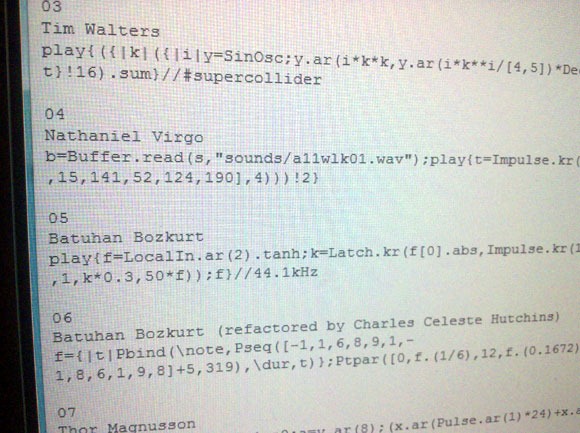How much can you do with a single line of musical code?
Scoring music using archaic-looking (but relatively fundamental) audio techniques, a group of composers has produced a free album. Each track, produced in the open source, multi-platform audio tool SuperCollider, is produced via only 140 characters of code. The work ranges from electronic grooves to droning ambiences to hypnotic melodic patterns… and yes, a few strange sounds. You can listen to the output as a conventional album, or if you install a copy of SuperCollider, you can run the code yourself – some of the tracks will sound different each time the code is executed.
The album, sc140, was released earlier in the fall but I didn’t get a chance to write about it; readers reminded me as the release of Mixtikl 2 yesterday brought a similar generative score-tweeting feature. Mixtikl’s approach is a little different; SuperCollider here is building sounds from scratch, whereas Mixtikl is tweeting higher-level information about a mix.
All of the code from the project is accessible, so this is an interesting way to learn about the capabilities of SuperCollider, and to find some of the commands you might want to understand if you’re delving in yourself.
If you’re not quite ready for writing code, the track audio is Creative Commons-licensed (BY-NC-SA 3), so you can sample the audio, as well.
Article + artist bios at The Wire (who collaborated on this release)
Album curated by Dan Stowell.
How all this started: SCTwitting, sharing code on Twitter
Lots of interesting artists in there, too, including Sciss aka Hanns Holger Rutz, whose OSC library for Java I’ve been using.
For more SuperCollider coding insanity:
